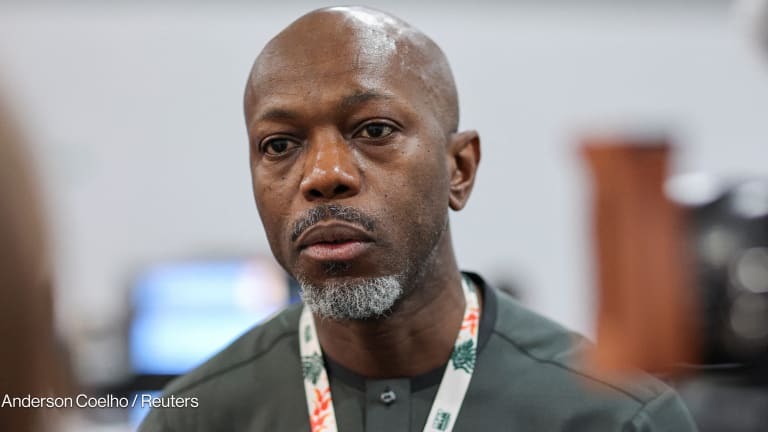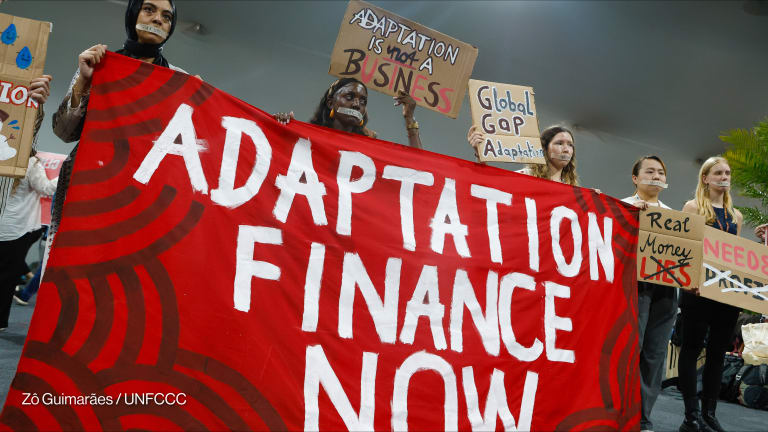
BONN, Germany — Adaptation was a key issue at the COP23 climate discussions that closed this weekend. Representatives from developing countries arrived at the conference in Bonn, Germany, looking for solutions to the problems created by rising temperatures, and for the money to begin implementing them.
Many expressed disappointment, both with donors and with the financing mechanisms that are supposed to help support these types of efforts. The situation has them looking to alternative sources — including the private sector.
It would be an unexpected partnership. Business has traditionally been more interested in activities that focus on mitigation, as they offer more immediate returns on investment. But private sector representatives said they are increasingly looking at ways they can work with governments and communities to promote adaptation efforts.
That was encouraging to some developing country representatives who participated in the two-week long conference. Though adaptation — a priority for developing countries — was frequently discussed, Joseph Mithika Mwenda, secretary-general of the Pan African Climate Justice Alliance, said no additional money appeared to be forthcoming.
“In Africa, adaptation is our main priority, more than mitigation.”
— Harisoa Hasina Rakotondrazafy, a senior officer in the World Wildlife Fund's Madagascar office
“We believe that adaptation should equally be an important aspect of climate action, the way mitigation is important,” he said. “But we are not seeing this happening, which is really a big disappointment for us in these negotiations.”
The interest in adaptation is manifold for much of the developing world. Because they are not emitters of greenhouse gases on the scale of developed countries, there are fewer opportunities to build projects around mitigation efforts.
At the same time, many developing countries are already dealing with the effects of rising temperatures, whether in changes to farming patterns, fish stocks, or dozens of other ways. The impact, representatives said, is on everything from ensuring people have enough to eat to maintaining health care systems. And countries need to begin adapting to those changes now, before the situation deteriorates further.
“We are now pushing that there needs to be a balance between adaptation and mitigation,” said Harisoa Hasina Rakotondrazafy, a senior officer in the World Wildlife Fund's Madagascar office. “In Africa, adaptation is our main priority, more than mitigation.”
Within the Paris Agreement, adaptation is on par with mitigation. The deal established a global goal of enhancing adaptive capacity, strengthening resilience, and reducing vulnerability to climate change. But the money has not necessarily followed.
New data from the Climate Policy Initiative tracking climate finance from 2015-16 showed $382 billion annually going to mitigation activities. Adaptation received $22 billion annually, with $5 billion going to projects that had dual benefits.
The Green Climate Fund, a global fund that is particularly tailored to support developing countries, is supposed to be a critical player to help balance these efforts. The fund is tasked with spending half of its money on adaptation initiatives. But experts said it has been slow to get going and adaptation projects have been particularly bogged down in bureaucracy.
Given these existing difficulties, the United States' decision to pull out of the Paris Agreement has only deepened concerns. Washington had pledged $3 billion to the Green Climate Fund, but has only paid $1 billion. The administration of President Donald Trump has said it will not pay out the rest.
That has left developing countries scrambling to find other sources to fund their adaptation efforts, including trying to build an unlikely alliance with the private sector.
“Very crudely put, adaptation doesn't work from a financial perspective, because the benefit is in the future,” said Vikram Widge, head of climate finance and policy at the International Finance Corporation. There is no incentive for the private sector.”
The CPI data shows almost no private sector money going into adaptation.
“Very crudely put, adaptation doesn't work from a financial perspective, because the benefit is in the future.”
— Vikram Widge, head of climate finance and policy at the International Finance CorporationJay Koh is one of the people trying to change that. Koh is the managing director of The Lightsmith Group, a private equity investment firm. At the climate talks two years ago, he started the Global Adaptation and Resilience Investment Working Group.
A beginning, he said, would be to identify better ways to analyze the risks posed by climate events and to develop products and services to address these risks.
“We have solutions,” Koh said. “Products and services that deal with that. Drought-resistant crops, drip irrigation, designed energy storage that can withstand storms.” The key is to “drop the cost and push them into developing countries. And using other instruments, push them into lower-income countries. And that would be a way to get started.”
In Bonn, the working group released a draft investor guide, “which really describes what the issue is for investors and what the potential opportunity might be,” he said. It identified opportunities that range from risk assessment products and services posed by physical climate risks to projects that reduce these risks.
And Koh will soon have the opportunity to begin acting on his own advice. The Nordic Development Fund has given The Lightsmith Group 500,000 euros ($590,000) to help develop the first global commercial investment vehicle focused on expanding available technologies and solutions for climate adaptation.
For his part, Widge said there might be opportunities for the private sector to contribute to climate resilience and infrastructure projects.
“We may invest in it for 10 years, 15 years, but these assets we are helping create live for 30, 40, 50 years,” he said. “We are starting to look at it from a physical risk perspective, with a view to manage the financial risk.”
It cannot, however, depend on the private sector alone, experts said. Officials are looking for the public sector and other actors to contribute and help offset some of the risk. But Koh said there is momentum building around developing workable models.
“I think for the first time you can say there's a true public-private start to dedicated investment strategy in the private sector focused on adaptation and resilience,” he said.
Read more Devex coverage on the COP23.








